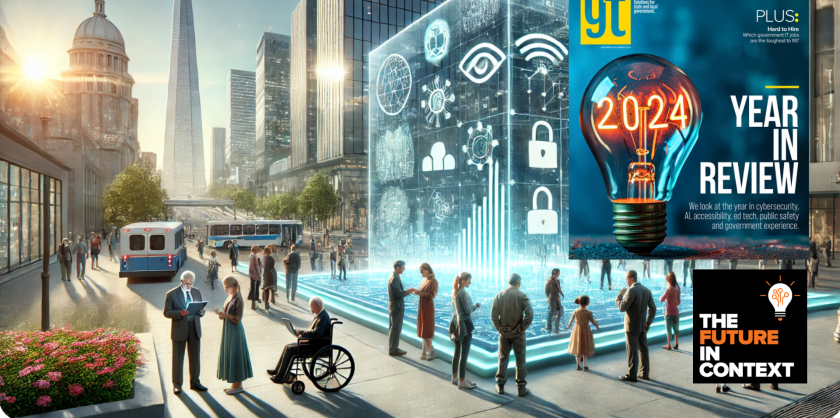The Future in Context
In a pivotal year, governments enacted AI laws, strengthened defenses, bridged the broadband gap, and prioritized accessible, user-friendly digital services. As 2025 nears, most jurisdictions still lack fully mature AI frameworks.
Future in Context
Sandy Stosz, a self-described stubborn retired vice admiral, digests the lessons in leadership from a 40-year career in the U.S. Coast Guard.
Jealously guarded as the country's most sacred text, the highest law in the land is an artifact of history even as competing forces put demands on it to guide the country into the future.
The Great Depression crushed the economy. The New Deal saved it. Can an analogy be made with today’s economic situation? Professor Jason Scott Smith talks about what happened in the 1930s and what might happen today.
The author of a new book on the pioneers of the civil rights movement says, as different as the two were from each other, they were also each other’s alter egos in the struggle against racism.
A new book the author calls “an owner’s manual for American citizens” recovers a lost language that Americans need to talk with each other about things that matter.
As a divided country wrestles with its future, it may be a good time to think about how we constitute a more perfect Union.
In the early years of the Republic, wives of politicians were often helpmates and could wield power despite their gender. Today, spouses challenge traditional gender norms in politics and have broad work portfolios.
The Constitution is silent on the number of justices on the Supreme Court. The independence of the judiciary is put in jeopardy when partisans settle political scores by rebalancing the courts.
As Congress debates the massive investment in American infrastructure, President Biden announces the withdrawal of U.S. forces from Afghanistan.
Ken Burns and his team have helped put American history in context through documentaries on topics ranging from the Civil War and Vietnam to jazz and baseball. Their latest takes on one of America’s greatest and complicated writers.
A prolific and outspoken author contends the term "populism" has been turned on its head, and not since Franklin Delano Roosevelt has the White House been occupied by a man of the people.
A new book chronicles the stories of sometimes broken, often desperate men who ventured to the northern plains in service of an industry that exemplifies late-stage capitalism.
A decade ago, Williston, N.D., became a magnet for desperate men, thanks to oil in the Bakken Formation. In an interview, author Michael Smith talks about life in an oil patch and the human cost of fueling the nation.
The recent Senate confirmation of the first Indigenous American, Deb Haaland, to lead a Cabinet department gives us reason to rethink our assumptions about First Nations’ relationship to power. A new book can help.
An important new book, Apollo’s Arrow, precisely targets what America got right in its COVID-19 response, and where it must do better next time. And there will be a next time.
The author of a new book on the coronavirus discusses how political expediency and an immature public have impaired America’s ability to meet the challenges and what we have learned as a country and what we have not.
The preparations for President Biden’s as-yet-unscheduled State of the Union address are haunted by a 400-year-old conspiracy to decapitate the British government. What can we learn from the Gunpowder Plot?
When a president leaves the White House, he enters one of the most elite clubs. A book by two of America’s leading journalists looks at what binds these individuals together, given their personalities and politics.
The printing press and social media democratized communication in their respective times. They both turned the order of things on its head — for good, for ill, and forever.
The COVID-19 pandemic reinforced how central technology is to modern life, but perhaps we are losing something.
In 1800, the country struggled to survive its first transition of power between John Adams, America’s first one-term president, and Thomas Jefferson, thanks to political intrigue, chaos and panic.
With incoming President Joe Biden pledging to unify the country, author David French talks about the nation’s current divide, whether the country is in decline and the prospects for a lasting union.
Transfers of power, a hallmark of our constitutional system, often come with shocks to the system. Trump’s refusal to concede may seem unprecedented, but it’s not the first time this has happened.
Editor-at-Large Clay Jenkinson and Professor Ed Watts explore what insights can be gained studying the last years of the Roman Republic and whether that has particular relevance in our own time.
For more than two centuries, the vice president has held little power, despite the position’s prominence. That may be changing, but the story of the No. 2 job in America is full of historical quirks.
The election of 1800 was the first time power was transferred from one political party to another. Hoping for a smooth transition involving prominent Founding Fathers, the country ended up with a constitutional crisis.
Donald Trump’s attempt to overturn the 2020 election results isn’t the first effort to change the outcome of a close race. In 1800, Thomas Jefferson faced a similar and chaotic post-electoral problem.
Presidential elections, your vote, and the quest for legitimacy. Unlike Donald Trump and Hillary Clinton, President-elect Joe Biden appears to have won both the popular vote and the Electoral College.
The peaceful transfer of power is a hallmark of American political life. But troubling talk from Trump, should he lose, has raised concerns and a reason to look back and examine the history of presidential changes.
If Trump’s third Supreme Court nominee is confirmed by the Senate, there is no guarantee she will continue to hold views congenial to the president. But does America still want its justices to be unelected and unaccountable?
About This Podcast
Most Read



























